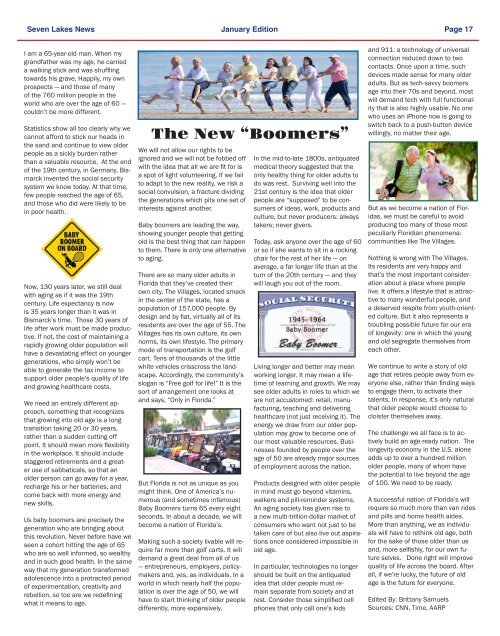You also want an ePaper? Increase the reach of your titles
YUMPU automatically turns print PDFs into web optimized ePapers that Google loves.
Seven Lakes News January Edition Page 17<br />
I am a 65-year-old man. When my<br />
grandfather was my age, he carried<br />
a walking stick and was shuffling<br />
towards his grave. Happily, my own<br />
prospects — and those of many<br />
of the 760 million people in the<br />
world who are over the age of 60 —<br />
couldn’t be more different.<br />
Statistics show all too clearly why we<br />
cannot afford to stick our heads in<br />
the sand and continue to view older<br />
people as a sickly burden rather<br />
than a valuable resource. At the end<br />
of the 19th century, in Germany, Bismarck<br />
invented the social security<br />
system we know today. At that time,<br />
few people reached the age of 65,<br />
and those who did were likely to be<br />
in poor health.<br />
Now, 130 years later, we still deal<br />
with aging as if it was the 19th<br />
century. Life expectancy is now<br />
is 35 years longer than it was in<br />
Bismarck’s time. Those 30 years of<br />
life after work must be made productive.<br />
If not, the cost of maintaining a<br />
rapidly growing older population will<br />
have a devastating effect on younger<br />
generations, who simply won’t be<br />
able to generate the tax income to<br />
support older people’s quality of life<br />
and growing healthcare costs.<br />
We need an entirely different approach,<br />
something that recognizes<br />
that growing into old age is a long<br />
transition taking 20 or 30 years,<br />
rather than a sudden cutting off<br />
point. It should mean more flexibility<br />
in the workplace. It should include<br />
staggered retirements and a greater<br />
use of sabbaticals, so that an<br />
older person can go away for a year,<br />
recharge his or her batteries, and<br />
come back with more energy and<br />
new skills.<br />
Us baby boomers are precisely the<br />
generation who are bringing about<br />
this revolution. Never before have we<br />
seen a cohort hitting the age of 65<br />
who are so well informed, so wealthy<br />
and in such good health. In the same<br />
way that my generation transformed<br />
adolescence into a protracted period<br />
of experimentation, creativity and<br />
rebellion, so too are we redefining<br />
what it means to age.<br />
The New “Boomers”<br />
We will not allow our rights to be<br />
ignored and we will not be fobbed off<br />
with the idea that all we are fit for is<br />
a spot of light volunteering. If we fail<br />
to adapt to the new reality, we risk a<br />
social convulsion, a fracture dividing<br />
the generations which pits one set of<br />
interests against another.<br />
Baby boomers are leading the way,<br />
showing younger people that getting<br />
old is the best thing that can happen<br />
to them. There is only one alternative<br />
to aging.<br />
There are so many older adults in<br />
Florida that they’ve created their<br />
own city. The Villages, located smack<br />
in the center of the state, has a<br />
population of 157,000 people. By<br />
design and by fiat, virtually all of its<br />
residents are over the age of 55. The<br />
Villages has its own culture, its own<br />
norms, its own lifestyle. The primary<br />
mode of transportation is the golf<br />
cart. Tens of thousands of the little<br />
white vehicles crisscross the landscape.<br />
Accordingly, the community’s<br />
slogan is “Free golf for life!” It is the<br />
sort of arrangement one looks at<br />
and says, “Only in Florida.”<br />
But Florida is not as unique as you<br />
might think. One of America’s numerous<br />
(and sometimes infamous)<br />
Baby Boomers turns 65 every eight<br />
seconds. In about a decade, we will<br />
become a nation of Florida’s.<br />
Making such a society livable will require<br />
far more than golf carts. It will<br />
demand a great deal from all of us<br />
— entrepreneurs, employers, policymakers<br />
and, yes, as individuals. In a<br />
world in which nearly half the population<br />
is over the age of 50, we will<br />
have to start thinking of older people<br />
differently, more expansively.<br />
In the mid-to-late 1800s, antiquated<br />
medical theory suggested that the<br />
only healthy thing for older adults to<br />
do was rest. Surviving well into the<br />
21st century is the idea that older<br />
people are “supposed” to be consumers<br />
of ideas, work, products and<br />
culture, but never producers: always<br />
takers; never givers.<br />
Today, ask anyone over the age of 60<br />
or so if she wants to sit in a rocking<br />
chair for the rest of her life — on<br />
average, a far longer life than at the<br />
turn of the 20th century — and they<br />
will laugh you out of the room.<br />
Living longer and better may mean<br />
working longer. It may mean a lifetime<br />
of learning and growth. We may<br />
see older adults in roles to which we<br />
are not accustomed: retail, manufacturing,<br />
teaching and delivering<br />
healthcare (not just receiving it). The<br />
energy we draw from our older population<br />
may grow to become one of<br />
our most valuable resources. Businesses<br />
founded by people over the<br />
age of 50 are already major sources<br />
of employment across the nation.<br />
Products designed with older people<br />
in mind must go beyond vitamins,<br />
walkers and pill-reminder systems.<br />
An aging society has given rise to<br />
a new multi-trillion-dollar market of<br />
consumers who want not just to be<br />
taken care of but also live out aspirations<br />
once considered impossible in<br />
old age.<br />
In particular, technologies no longer<br />
should be built on the antiquated<br />
idea that older people must remain<br />
separate from society and at<br />
rest. Consider those simplified cell<br />
phones that only call one’s kids<br />
and 911: a technology of universal<br />
connection reduced down to two<br />
contacts. Once upon a time, such<br />
devices made sense for many older<br />
adults. But as tech-savvy boomers<br />
age into their 70s and beyond, most<br />
will demand tech with full functionality<br />
that is also highly usable. No one<br />
who uses an iPhone now is going to<br />
switch back to a push-button device<br />
willingly, no matter their age.<br />
But as we become a nation of Floridas,<br />
we must be careful to avoid<br />
producing too many of those most<br />
peculiarly Floridian phenomena:<br />
communities like The Villages.<br />
Nothing is wrong with The Villages.<br />
Its residents are very happy and<br />
that’s the most important consideration<br />
about a place where people<br />
live. It offers a lifestyle that is attractive<br />
to many wonderful people, and<br />
a deserved respite from youth-oriented<br />
culture. But it also represents a<br />
troubling possible future for our era<br />
of longevity: one in which the young<br />
and old segregate themselves from<br />
each other.<br />
We continue to write a story of old<br />
age that retires people away from everyone<br />
else, rather than finding ways<br />
to engage them, to activate their<br />
talents. In response, it’s only natural<br />
that older people would choose to<br />
cloister themselves away.<br />
The challenge we all face is to actively<br />
build an age-ready nation. The<br />
longevity economy in the U.S. alone<br />
adds up to over a hundred million<br />
older people, many of whom have<br />
the potential to live beyond the age<br />
of 100. We need to be ready.<br />
A successful nation of Florida’s will<br />
require so much more than van rides<br />
and pills and home health aides.<br />
More than anything, we as individuals<br />
will have to rethink old age, both<br />
for the sake of those older than us<br />
and, more selfishly, for our own future<br />
selves. Done right will improve<br />
quality of life across the board. After<br />
all, if we’re lucky, the future of old<br />
age is the future for everyone.<br />
Edited By: Brittany Samuels<br />
Sources: CNN, Time, AARP

















